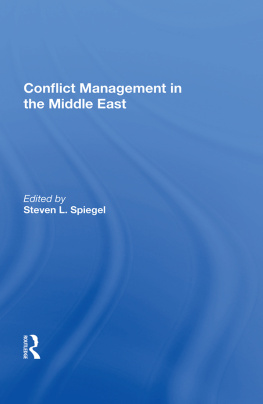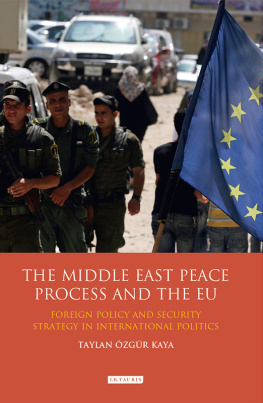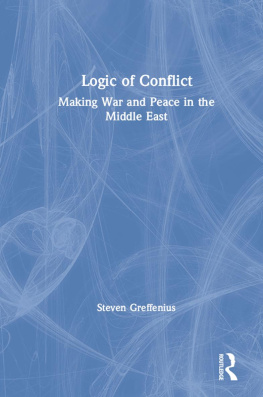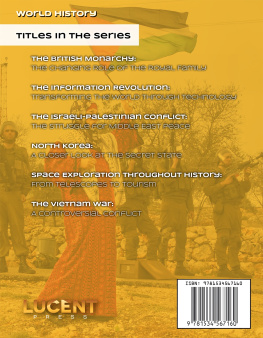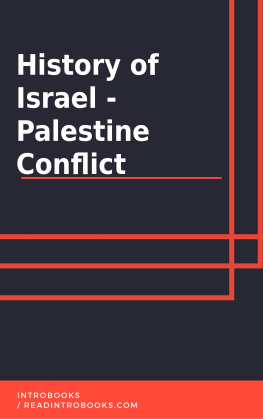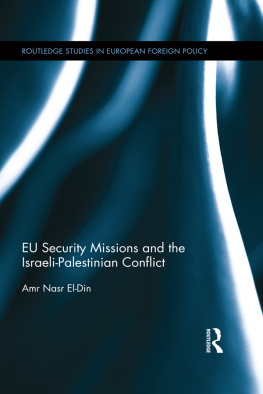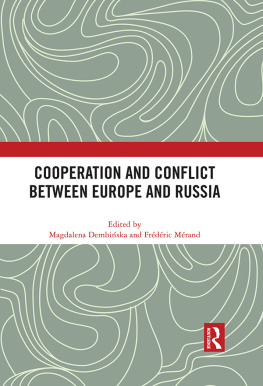Conflict Management in the Middle East
First published 1992 by Westview Press
Published 2018 by Routledge
52 Vanderbilt Avenue, New York, NY 10017
2 Park Square, Milton Park, Abingdon, Oxon OX14 4RN
Routledge is an imprint of the Taylor & Francis Group, an informa business
Copyright 1992 by Taylor & Francis
All rights reserved. No part of this book may be reprinted or reproduced or utilised in any form or by any electronic, mechanical, or other means, now known or hereafter invented, including photocopying and recording, or in any information storage or retrieval system, without permission in writing from the publishers.
Notice:
Product or corporate names may be trademarks or registered trademarks, and are used only for identification and explanation without intent to infringe.
Library of Congress Cataloging-in-Publication Data
Conflict management in the Middle East / edited by Steven
L. Spiegel.
p. cm.
Includes index.
ISBN 0-8133-8218-1
1. Middle EastPolitics and government1979-. 2. Conflict
managementMiddle East 3. Persian GulfWar, 1991. I. Spiegel,
StevenL.
DS63.1.S87 1992
956.05dc20
92-6018
CIP
A CIP catalogue record for this book is available from the British Library.
ISBN 1-85567-059-3
ISBN 13: 978-0-367-01628-9 (hbk)
Contents
, Steven L. Spiegel and David J. Pervin
PART ONE
The Changing International Setting
, Steven L. Spiegel
, Graham E. Fuller
PART TWO
Theoretical Underpinnings
Richard Ned Lebow and Janice Gross Stein
, Mark A. Heller and Abraham Ben-Zvi
, Benjamin Miller
PART THREE
Historical Cases
, Mostafa-Elwi Saif
, Aharon Yariv
, Steven L. Spiegel
, Fred Wehling
, Richard D. Anderson, Jr.
, Yehoshafat Harkabi
, Ziad Abu-Amr
, Shibley Telhami
, Georgi Mirski
PART FOUR
Policy Implications: Potential for Soviet-American Cooperation in the Middle East
, Andrei Shoumikhin
, Michael D. Intriligator and Dagobert L. Brito
, Dore Gold
, Emile Sahliyeh
, Alexei Vassiliev
, Galia Golan and Gur Ofer
Guide
This volume emerged from a workshop, which was co-sponsored by the Institute on Global Conflict and Cooperation of the University of California and the Center for International and Strategic Affairs at UCLA. Financial contributions were received from the United States Institute of Peace, International Studies and Overseas Programs (ISOP) at UCLA, the East-West Forum, Stanley Sheinbaum, Lermitage Hotels, Pan-American World Airways, the Center for Russian and East European Studies at UCLA, and the Institute on Global Conflict and Cooperation of the University of California. The participants of this project wish to thank these contributors for making this effort possible.
In addition they wish to credit the work of Susan Greer, Julia Ingraham, and Patty Patarek of the IGCC staff for their efforts in conjunction with Gerri Harrington of the UCLA Center for International and Strategic Affairs. Professor John Ruggie, director of IGCC, gave the project his unstinting support, as did Professor Michael Intriligator, the director of CIS A at UCLA. The participants also wish to thank the following institutes in various countries for their cooperation: the Moscow State Institute for International Relations (MGIMO), the Jaffee Center for Strategic Affairs at Tel Aviv University, the Hebrew University Department of Political Science, and the Al-Ahram Strategic Studies Center in Cairo. The participants also wish to thank Ms. Joan Levinson for her concerted efforts to help coordinate the conference.
In terms of this manuscript, the editor wishes to thank Val Phillips and Kimberlee Ward for supervising the editing, collation and preparation of the manuscript. In addition, the work of David Pervin, Gitty Cannon, Adam Stohlberg, Michael Chan, Naomi Renek, Kathleen Najmzadeh, Nancy Lapp, Scott McIntosh, Craig Wu, Holly Urban, Samira Sadeghi, Renat Engel, Melissa Mograss, and Andrew Gomperts is recognized and appreciated.
This kind of intercontinental effort requires the cooperation of many from various countries, and we are indeed grateful that all of these participants made the publication of this volume possible.
S.L.S.
Los Angeles
Steven L. Spiegel and David J. Pervin
The recent events in Europe and the Soviet Union have caused fundamental changes in the international system and challenged many of the assumptions upon which the analysis of international affairs has traditionally been based. For some forty years after the end of World War II the competition between the United States and the Soviet Union dominated world politics. The paradox of this competition is that while it was global, deliberate war between the two superpowers was inconceivable given the massive destructive potential of nuclear weapons.
Accidental war, on the other hand, remained a possibility, and a frightful one at that. Such a war was unlikely to occur in Europe, where the lines were clearly drawn and the interests obviously great. Where spheres of interests were not as clearly defined, mistakes were possible. The difficulty both superpowers had in controlling the actions of their respective client states, each of which had their own interests which at times conflicted with their patrons, increased the risk of such mistakes.
The Middle East, as the region with the murkiest delineation of superpower interests, the greatest independence of action by clients, and the most profound conflict among local states, created the most concern. It is not surprising that the Middle East was known as the Balkans of the late twentieth century. If accidental war, caused by miscalculation and escalation, was to occur, the Middle East was the most likely point of origin. Indeed, in 1973 the United States used a discreet but clear nuclear warning in order to deter a possible Soviet intervention. On a number of occasions American and Soviet naval forces jockeyed for position in the Mediterranean. Yet no shots were fired, and war did not occur.
The reasons that competition did not turn into conflict is the central focus of this volume. The chapters are unique in three ways. First, the authors are drawn from the United States, the Soviet Union and the Middle East. The unprecedented participation of scholars from the U.S.S.R. in itself reflects the radical changes in that country and the end of the Cold War. Second, theoretical, historical, and policy aspects of the interaction of the Middle Eastern states and the two superpowers are examined, with an emphasis on how the United States and the Soviet Union have attempted to manage their competition in the region. Third, these articles were written as the conflict between the United States and Iraq unfolded. Many therefore attempt to integrate the crisis and war into their analysis. The first chapter, by Steven L. Spiegel, provides an overview of the Gulf Crisis and War, focusing on its unique nature. Graham E. Fuller proceeds to present a regional perspective of the ongoing international changes.
The next section of this volume explores theoretical approaches to conflict management and crisis avoidance. Janet Gross Stein and Richard Ned Lebow argue that deterrence, the dominant security policy of the United States and Israel, may have contributed to each states defense while also exacerbating the conflict with their respective rivals. They therefore suggest that a policy of reassurance might contribute to conflict resolution. With the end of the Cold War their suggestions take on added resonance.

